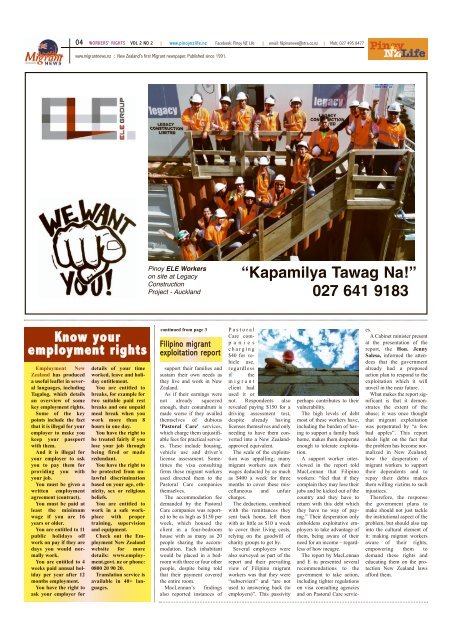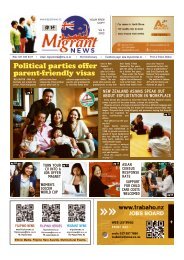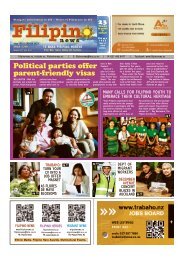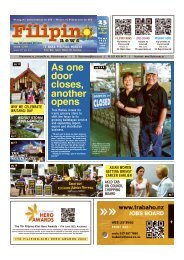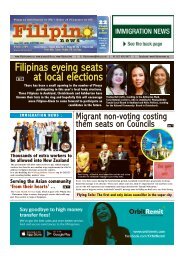Pinoy NZ Life Dec 18
www.pinoynzlife.nz (South Island, New Zealand's own Filipino newspaper since 2014). We also publish www.filipinonews.nz (New Zealand wide circulation since 2000). email: filipinonews@xtra.co.nz or txt/mobile: 027 495 8477
www.pinoynzlife.nz (South Island, New Zealand's own Filipino newspaper since 2014). We also publish www.filipinonews.nz (New Zealand wide circulation since 2000). email: filipinonews@xtra.co.nz or txt/mobile: 027 495 8477
You also want an ePaper? Increase the reach of your titles
YUMPU automatically turns print PDFs into web optimized ePapers that Google loves.
04 WORKERS’ RIGHTS VOL 2 NO 2 | www.pinoynzlife.nz Facebook: <strong>Pinoy</strong> <strong>NZ</strong> <strong>Life</strong> | email: filipinonews@xtra.co.nz | Mob: 027 495 8477<br />
www.migrantnews.nz : New Zealand’s first Migrant newspaper. Published since 1991.<br />
<strong>Pinoy</strong> ELE Workers<br />
on site at Legacy<br />
Construction<br />
Project - Auckland<br />
“Kapamilya Tawag Na!”<br />
027 641 9<strong>18</strong>3<br />
Know your<br />
employment rights<br />
Employment New<br />
Zealand has produced<br />
a useful leaflet in several<br />
languages, including<br />
Tagalog, which details<br />
an overview of some<br />
key employment rights.<br />
Some of the key<br />
points include the fact<br />
that it is illegal for your<br />
employer to make you<br />
keep your passport<br />
with them.<br />
And it is illegal for<br />
your employer to ask<br />
you to pay them for<br />
providing you with<br />
your job.<br />
You must be given a<br />
written employment<br />
agreement (contract).<br />
You must be paid at<br />
least the minimum<br />
wage if you are 16<br />
years or older.<br />
You are entitled to 11<br />
public holidays off<br />
work on pay if they are<br />
days you would normally<br />
work.<br />
You are entitled to 4<br />
weeks paid annual holiday<br />
per year after 12<br />
months employment.<br />
You have the right to<br />
ask your employer for<br />
details of your time<br />
worked, leave and holiday<br />
entitlement.<br />
You are entitled to<br />
breaks, for example for<br />
two suitable paid rest<br />
breaks and one unpaid<br />
meal break when you<br />
work more than 8<br />
hours in one day.<br />
You have the right to<br />
be treated fairly if you<br />
lose your job through<br />
being fired or made<br />
redundant.<br />
You have the right to<br />
be protected from unlawful<br />
discrimination<br />
based on your age, ethnicity,<br />
sex or religious<br />
beliefs.<br />
You are entitled to<br />
work in a safe workplace<br />
with proper<br />
training, supervision<br />
and equipment.<br />
Check out the Employment<br />
New Zealand<br />
website for more<br />
details: www.employment.govt.<br />
nz or phone:<br />
0800 20 90 20.<br />
Translation service is<br />
available in 40+ languages.<br />
continued from page 3<br />
Filipino migrant<br />
exploitation report<br />
support their families and<br />
sustain their own needs as<br />
they live and work in New<br />
Zealand.<br />
As if their earnings were<br />
not already squeezed<br />
enough, their conundrum is<br />
made worse if they availed<br />
themselves of dubious<br />
'Pastoral Care' services,<br />
which charge them unjustifiable<br />
fees for practical services.<br />
These include housing,<br />
vehicle use and driver’s<br />
license assessment. Sometimes<br />
the visa consulting<br />
firms these migrant workers<br />
used directed them to the<br />
Pastoral Care companies<br />
themselves.<br />
The accommodation fee<br />
demanded by the Pastoral<br />
Care companies was reported<br />
to be as high as $150 per<br />
week, which housed the<br />
client in a four-bedroom<br />
house with as many as 20<br />
people sharing the accommodation.<br />
Each inhabitant<br />
would be placed in a bedroom<br />
with three or four other<br />
people, despite being told<br />
that their payment covered<br />
the entire room.<br />
MacLennan’s findings<br />
also reported instances of<br />
Pastoral<br />
Care companies<br />
charging<br />
$40 for vehicle<br />
use,<br />
regardless<br />
if the<br />
migrant<br />
client had<br />
used it or<br />
not. Respondents also<br />
revealed paying $150 for a<br />
driving assessment test,<br />
despite already having<br />
licenses themselves and only<br />
needing to have them converted<br />
into a New Zealandapproved<br />
equivalent.<br />
The scale of the exploitation<br />
was appalling; many<br />
migrant workers saw their<br />
wages deducted by as much<br />
as $400 a week for three<br />
months to cover these miscellaneous<br />
and unfair<br />
charges.<br />
The deductions, combined<br />
with the remittances they<br />
sent back home, left them<br />
with as little as $10 a week<br />
to cover their living costs,<br />
relying on the goodwill of<br />
charity groups to get by.<br />
Several employers were<br />
also surveyed as part of the<br />
report and their prevailing<br />
view of Filipino migrant<br />
workers was that they were<br />
“subservient” and “are not<br />
used to answering back (to<br />
employers)”. This passivity<br />
perhaps contributes to their<br />
vulnerability.<br />
The high levels of debt<br />
most of these workers have,<br />
including the burden of having<br />
to support a family back<br />
home, makes them desperate<br />
enough to tolerate exploitation.<br />
A support worker interviewed<br />
in the report told<br />
MacLennan that Filipino<br />
workers: “feel that if they<br />
complain they may lose their<br />
jobs and be kicked out of the<br />
country and they have to<br />
return with this debt which<br />
they have no way of paying.”<br />
Their desperation only<br />
emboldens exploitative employers<br />
to take advantage of<br />
them, being aware of their<br />
need for an income – regardless<br />
of how meagre.<br />
The report by MacLennan<br />
and E tu presented several<br />
recommendations to the<br />
government to take action,<br />
including tighter regulations<br />
on visa consulting agencies<br />
and on Pastoral Care services.<br />
A Cabinet minister present<br />
at the presentation of the<br />
report, the Hon. Jenny<br />
Salesa, informed the attendees<br />
that the government<br />
already had a proposed<br />
action plan to respond to the<br />
exploitation which it will<br />
unveil in the near future.<br />
What makes the report significant<br />
is that it demonstrates<br />
the extent of the<br />
abuse; it was once thought<br />
that migrant exploitation<br />
was perpetrated by “a few<br />
bad apples”. This report<br />
sheds light on the fact that<br />
the problem has become normalized<br />
in New Zealand;<br />
how the desperation of<br />
migrant workers to support<br />
their dependents and to<br />
repay their debts makes<br />
them willing victims to such<br />
injustices.<br />
Therefore, the response<br />
the government plans to<br />
make should not just tackle<br />
the institutional aspect of the<br />
problem, but should also tap<br />
into the cultural element of<br />
it: making migrant workers<br />
aware of their rights,<br />
empowering them to<br />
demand these rights and<br />
educating them on the protection<br />
New Zealand laws<br />
afford them.


